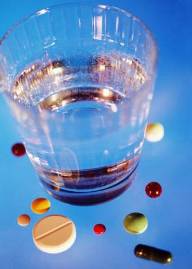Drugs in Drinking Water
A Growing Concern Affecting Our Health and Environment
by Merlin Hearn
Note: As an Amazon Associate I earn from qualifying purchases.
Trace amounts of pharmaceutical drugs in drinking water have been found in many U.S. cities. These drugs can potentially affect our health and well being in many ways, especially in the long-term.
A recent study with fish found that diluted concentrations of some of the drugs found in drinking water (mainly antidepressants) affected hormonal changes, appetite, mood, sex, and even genetic mutation.
The research is just starting to gain momentum, but the EPA and other health organizations do recognize it as a serious concern.
This article will address how these drugs enter our drinking water, the possible and tangible effect on our bodies and environment, and what we can do to limit our pollution and protect our health.
How the Drugs Get Into Our Drinking Water
The pharmaceutical drugs enter our water through the septic systems and pharmaceutical production plants.
When we take a medication, only about 20% of this pill will be digested and the other 80% will be unused—excreted from our bodies and turned to waste.
Once the waste reaches back to the water treatment plant, it will be re-filtered and purified, but the water treatment plants are not currently filtering for pharmaceutical chemicals, so a majority of these chemicals are not eliminated from the water.
Scientific Research
Until recently, scientists and the Environmental Protection Agency did not recognize the trace amounts of pharmaceutical drugs in drinking water as a serious problem.
A study was conducted on the fish in the Potomac River, near Washington D.C., that showed signs of them having both male and female characteristics, where estrogen was found in high levels.
More studies were done and diluted concentrations of chemicals, mainly antidepressants (1.8 mg/l), were found to affect the mood of fish species, the sex of the fish, an increase in eating, and even signs of genetic mutation, associated in humans with autism.
How These Chemicals May Affect Our Health
Detractors have said that these chemicals in our drinking water are in such small amounts, usually in the millionth or billionth percentile, that they won’t affect humans in the same way that they affect fish.
They say that the human processing system is much more advanced than animals.
They also reason that since these chemicals were specifically made for humans, they won’t affect us the same way they do the fish.
While the short-term effect of ingesting these drugs in drinking water does not seem to be a major concern to scientists, many are still worried about the long-term effect.
Scientists are also worried about the effect this water will have on pregnant women and their developing babies.
The concern is that these babies, while in the womb, are much more susceptible to chemicals entering and affecting the brain, due to a leaky blood-brain barrier.
What We Can Do
Even though the research is not conclusive yet about the effect these drugs in drinking water have on human health, most of us would rather not be ingesting any amount of medications that we don’t need.
Most filtration devices are not effective at filtering out these chemicals for the same reason that the large filtration systems of cities are not effective. They simply are not designed to deal with pharmaceutical chemical filtration.
However, Sarah Janssen, a science fellow at the Natural Resources Defense Council, says that charcoal filters and reverse osmosis are the most effective filters studied so far.
Reverse osmosis water is demineralized and not recommended for long-term use.
Thus, investing in a multi-stage, carbon-based drinking water system for your home is the best way to protect yourself and your family from ingesting these drugs. Check out our drinking water filter recommendations.
Another way we can protect ourselves and the environment is by not flushing our unused or unneeded medications down the toilet.
Instead, mix them with coffee grounds or cat litter (something an animal wouldn’t eat) and throw them in the trash.
Return from Drugs in Drinking Water to Water Contaminants
If you would like to reproduce or republish this article or any other article on this site, feel free to do so but please include a reference or link to the article at WaterBenefitsHealth.com.
Sign Up for Our Monthly
Newsletter
Visitor Comments
"This was the best and most straight forward info on the net yet. I asked a question and got an answer that made sense. Thank you so much!" - Linderlinder
FINALLY!!! I have been wondering about this for years with no 'solid' answer. This is exactly what I've been wanting to know! Thank you for this share..." by Andy
"Thank you for the information, Nancy. I appreciate it. Your article and findings are very helpful, referring to dehydration." - Carolyn
"Lemon water is one drink both my wife and I can't drink. It upsets our stomachs. We are in our sixties and in very good health—well, better health now that we drink about 2 liters plus of water each day. It has made so much difference to our digestive systems and recovery every day. Thank you for your website and effort." - Rod



